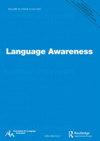“It ain’t what you say. It’s the way you say it”: adapting the matched guise technique (MGT) to raise awareness of accentedness stereotyping effects among Swedish pre-service teachers
IF 2.2
2区 文学
0 LANGUAGE & LINGUISTICS
引用次数: 0
Abstract
Abstract The study describes a pedagogic adaptation of the matched guise technique with the aim to raise linguistic self-awareness of L2 accentedness stereotyping effects among Swedish pre-service teachers. In the experiment, 290 students attending teacher training programs were exposed to one of two matched guises, representing either L1 accented Swedish, or L2 accented Swedish. Both guises were based on the same recording, but the L2 accented version had been digitally manipulated using cut-and-paste techniques in order to replicate certain vowel sounds (the [u:]-sound in particular) associated with low-prestige Swedish L2 accentedness. The findings from this experiment were then used as starting point for language awareness raising activities. Our overall results show that the L2 accented manipulated recording was evaluated more favourably than the original L1 accented recording on all investigated variables. One proposed explanation is that respondents were inadvertently influenced by so-called shifting standards effects, i.e. lower standards/expectations are being used as reference points when evaluating the L2 accented recording. This tendency, however, seemed to be less apparent among respondents with bi/multilingual linguistic identities. Following debriefing discussions based on the experiment findings, there were clear indications that respondents did become more aware of inadvertent linguistic stereotyping by participating in the activities.“不是你说的那样。这是你说话的方式”:采用匹配伪装技术(MGT)来提高瑞典职前教师对口音刻板印象效应的认识
摘要本研究旨在提高瑞典职前教师对二语口音刻板印象效应的语言自我意识。在实验中,290名参加教师培训项目的学生被暴露在两种匹配的伪装中,分别代表L1口音的瑞典语和L2口音的瑞典语。两种版本都是基于相同的录音,但L2口音版本已经使用剪切粘贴技术进行了数字处理,以复制某些元音(特别是[u:]-音)与低地位的瑞典L2口音相关。这个实验的结果随后被用作提高语言意识活动的起点。我们的总体结果表明,在所有调查的变量上,L2口音被操纵的记录比原始L1口音记录的评估更有利。一种可能的解释是,受访者无意中受到了所谓的标准转移效应的影响,即在评估第二语言口音录音时,较低的标准/期望被用作参考点。然而,这种趋势在具有双/多语言身份的受访者中似乎不太明显。在基于实验结果的述职讨论之后,有明确的迹象表明,通过参与这些活动,受访者确实更加意识到无意的语言刻板印象。
本文章由计算机程序翻译,如有差异,请以英文原文为准。
求助全文
约1分钟内获得全文
求助全文
来源期刊

Language Awareness
Multiple-
CiteScore
3.70
自引率
10.00%
发文量
18
期刊介绍:
Language Awareness encourages and disseminates work which explores the following: the role of explicit knowledge about language in the process of language learning; the role that such explicit knowledge about language plays in language teaching and how such knowledge can best be mediated by teachers; the role of explicit knowledge about language in language use: e.g. sensitivity to bias in language, manipulative aspects of language, literary use of language. It is also a goal of Language Awareness to encourage the establishment of bridges between the language sciences and other disciplines within or outside educational contexts.
 求助内容:
求助内容: 应助结果提醒方式:
应助结果提醒方式:


